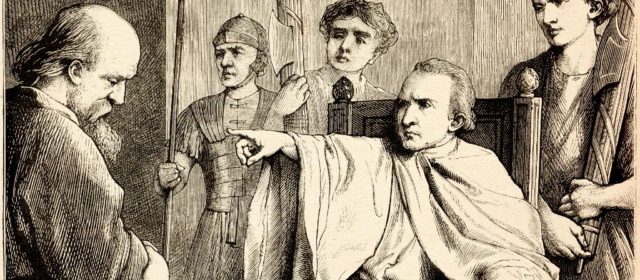The Jewish Leader’s Vain Attempts to Silence Jesus’ Resurrection. who by the mouth of Your servant David have said: ‘Why did the nations rage, And the people plot vain things? The kings of the earth took their stand, And the rulers were gathered together Against the LORD and against His Christ.’ Acts 4:25-26 . When Jesus was taken down from the cross, laid in a tomb and a large stone rolled in front sealing the entrance (Matt. 27:57-60), a time of monumental folly and futility from the Jewish leaders ensued: Now on the next day [the Sabbath], which is the one after the preparation, the chief priests and the Pharisees gathered together with Pilate, saying ‘Sir, we remember that when He was still alive that deceiver said, ‘After three days I am to rise again.’ Therefore, give orders for the grave to be made secure until the third day, lest the disciples come and steal Him away and say to the people, ‘He has risen from the dead,’ and the last deception will be worse than the first. Pilate said to them, ‘You have a guard; go, make it as secure as you know how.’ (Matt. 27:62-65–brackets added). However, the flagitious plot of the chief priests [Sadducees] and Pharisees backfired. They were so concerned about Jesus’ disciples proclaiming to the nation “He [Jesus] has risen from the dead”, that they grossly underestimated the power of God. For after three days God raised Jesus from the dead and He appeared not only to His disciples, but to over five hundred witnesses over a forty day period, as recorded in Scripture (Acts 1:3, 1 Cor. 15:5-8). Furthermore, God made certain many more would testify to the power of the resurrection: “the tombs were opened; and many bodies of the saints who had fallen asleep were raised; and coming out of the tombs. After His resurrection they entered the holy city and appeared to many.” (Matt. 27:52-53). God’s omnipotence was demonstrated in that supernatural event, when hundreds, if not thousands witnessed the truth of the resurrection. Meanwhile, the women went out to the tomb to anoint Jesus’ body with spices, but were astonished to see that it was empty; for an angel from heaven had rolled away the stone from the entrance revealing an empty tomb. Speaking to the women the angel said: “Do not be afraid; for I know that you are looking for Jesus who has been crucified. He is not here, for He has risen, just as He said. Come, see the place where He was lying. And go quickly and tell His disciples that He has risen...
Read MoreRegarding John the Baptist Jesus earnestly declared, “Truly, I say to you, among those born of women there has not arisen anyone greater than John the Baptist… [Matt. 11:11], yet there is very little written exclusively on this “great” man and the significance of his ministry. When the angel Gabriel appeared to Zacharias, he declared that his son John [the Baptist], was to be a Nazirite 1 and forerunner of the incarnate Christ–the herald for the coming of God to earth. (Luke 1:13-17, Jn. 1:6, 14). In other words, John was to pave the way for the Lord Jesus Christ. Amazingly, in eternity past Christ was in full glory and equal with the Father, but He emptied Himself, took on flesh and humbly ministered to mankind on earth. (Jn. 17:5, Phil. 2:6-7, Jn. 1:14, Luke 4:17-18). It’s mind-boggling to contemplate, that the God of the universe employed a mere man [John the Baptist], to be the precursor for His Son, Jesus Christ. In the prologue 2 to the John’s Gospel [the first eighteen verses], John the Baptist is referenced four times (Jn. 1:6, 7, 8, 15). The prologue is very important to John’s Gospel, because it outlines: 1) The eternal Christ (vv. 1-3); 2) the incarnate Christ (vv. 4-5); 3) the forerunner of Christ (vv. 6-8); 4) the unrecognized Christ (vv. 9-11); 5) the omnipotent Christ (vv. 12-13); and the glorious Christ (vv. 14-18). 3 Interestingly, the heretical system of Roman Catholicism deifies Jesus’ mother Mary and she sparsely appears in Scripture. John the Baptist on the other hand, is referenced numerous times in Scripture, yet there is little recognition of his greatness in the sphere of Christianity. This seems antithetical to the teachings of Jesus, who frequently gave strong testimonies to John and his ministry. For example He proclaimed: “You have sent to John, and he has borne witness to the truth But the witness which I receive is not from man, but I say these things that you may be saved. He was the lamp that was burning and was shining and you were willing to rejoice for a while in his light.” (Jn. 5:33-35). Jesus also declared: “But why did you go out? To see a prophet? Yes, I say to you, and one who is more than a prophet.” (Matt. 11:9). And: “For John came to you in the way of righteousness and you did not believe him; but the tax-gatherers and harlots did believe him; and you, seeing this, did not even feel remorse afterward so as to believe him”. (Matt. 21:32). In John chapter five Jesus names John the Baptist as one...
Read More“…and you, being a wild olive, were grafted in among them and became partaker with them of the rich root of the olive tree.” Rom. 11:17 I am a “Gentile” [non-Jewish] who is considered a son of the God of Israel, adopted into His family and an heir of promise, held tightly to His bosom forever (cf. Rom. 8:17, 35). By God’s sovereign mercy and amazing grace, I was called and granted the faith to believe in His Son, Jesus Christ. It is because of His [free] gift of grace that I’m exceedingly grateful. As a Gentile, I am considered a “wild olive branch”, 1 that has been supernaturally “grafted” 2 into the natural “olive tree”,3 to share in the “richness” 4 of God’s covenant blessings. Supported by the olive tree’s “root”, 4 I, like all elect non-Jewish believers, add to the countless spiritual descendents of Abraham God promised to bless (Rom. 11:17, Gen. 12:2, 15:5, 17:4-5, Gal. 3:7-8, 29). Astonishingly, I’m like one of those innumerable stars in an evening sky, that God challenged Abraham to calculate (Gen. 15:5). In the covenant God made with Abraham, He promised through Abraham’s “seed”, that all of mankind would be blessed (Gen. 12:3, 22:18): “And the Scripture, foreseeing that God would justify the Gentiles by faith, preached the gospel beforehand to Abraham, saying, ‘All the nations shall be blessed in you.'” (Gal. 3:8). God has kept that promise, for all Gentiles [and all men] who have faith in Jesus Christ, are considered “spiritual” descendants of Abraham: “And if you belong to Christ, then you are Abraham’s offspring, heirs according to promise.” (Gal. 3:29, cf. 3:8, 25-28). However, one day in the future, Abraham’s “physical” seed “all” Israel, will believe in the Messiah Jesus and become God’s “spiritual” children as well (Rom. 11:26-27). The nation of Israel was uniquely chosen by God to receive His “special” love and set apart from other nations, requiring them to remain faithful and obedient only to Him (Deut. 7:6-8, Ex. 20:3-6). Tragically, Israel failed miserably to keep God’s commandments and repeatedly tested His patience by their rebelliousness and idolatry, thus provoking Him to anger (Deut. 32:21). One of the ways God brought judgment against Israel, was by demonstrating mercy to the Gentiles. He offered them salvation and through prophets informed Israel of His intentions (Deut. 32:20-21, Isa. 65:1-3a). Therefore, I am grateful for Israel’s disobedience and subsequent judgment by God, realizing it’s because of their disobedience that I have obtained God’s mercy. Not that I sinisterly exult in Israel’s punishment because of their sin against God, as many nations had done–for example...
Read More“Blessed are they who did not see, and yet believed.” Jn. 20:29 The question many Christians wrestle with is did God create the universe, in billions of years or in six twenty-four hour days, according to Genesis chapter one? The various answers given to this query have been the subject of theological debates for numerous years. Many who are fastidious to the veracity of Scripture, surprisingly balk at God’s claim to the creation account in Genesis one. Moreover, it is especially disturbing to learn that a vast majority of Christian teaching institutions, have abandoned the ostensive teaching of Genesis 1-3. Dr. John MacArthur, president of The Master’s Seminary observed: “I recall reading a survey a few years ago which revealed that in one of America’s leading evangelical accrediting associations, whose membership boasted scores of evangelical Bible colleges and universities, only five or six college-level schools remain solidly opposed to the old-earth view of creation. The rest are open to a reinterpretation of Genesis 1-3 that accommodates evolutionary theories.” That said, if you interpret the creation account of Genesis literally and in context, you will unquestionably end up with a six twenty-four hour day creation: “And there was evening and there was morning, one day.” The wording in the Bible is not only crystal clear, but fundamental regarding God’s miraculous creation account. The following points in this short article are for the student of Scripture’ consideration, to help determine the feasibility and probability of a six-day creation. Yom “…And there was evening and there was morning, one day.” Gen. 1:5 When the creation account in Genesis one is taken in context, the Hebrew word yom [day], clearly means a twenty-four hour period: “And there was evening and there was morning, one day.” (Gen. 1:5, also see 1:8, 13, 19, 22, 31). One needs not be a Hebrew scholar, in order to understand that God communicated much of Scripture, especially the creation account, in a simplistic manner. Interestingly, He also employed a similar simplicity [in the New Testament Greek word construction] in the Gospel of John, so that there would not be any doubt as to Jesus Christ’ deity (Jn. 1:1-4). However, despite the unambiguous translation from Hebrew to our English versions of Genesis one, many professing Christians deny, that the Bible claims a six twenty-four hour day creation. For instance, they interpret yom [day], in Genesis one, to mean exceedingly long periods of time e.g., millions and millions of years. Dr. Allen P. Ross commenting on yom [day] made this assertion: “The meaning of the term “day” [yom]…can…mean a longer general period of time (Isa. 61:2)…however, it [yom], in...
Read More“Now the chief priests and the whole Council kept trying to obtain false testimony against Jesus, in order that they might put Him to death” Matt. 26:59 The year was 155 A.D. when Polycarp, the bishop of Smyrna, (the same church as found in the book of Revelation), at eighty-six years of age, was martyred for his faith. Moreover, he was a devout disciple of the Apostle John, who himself was one of the twelve disciples of Jesus Christ. Polycarp was brought before the Roman Proconsul,1 who sternly warned him to renounce his belief in Jesus Christ. He was strongly advised to repent from his alleged “atheism” and to audibly proclaim, “Swear by the fortune of Caesar; repent, and say ‘Away with the atheists!'” [indicating the Christians]. Polycarp gazed intently at the godless, bloodthirsty and pagan multitude that filled the arena, and gesturing towards them, he said, “Away with the Atheists!” The proconsul insisted; “Swear and I will set you free – revile Christ!” Polycarp answered, “Eighty and six years I served Him and he has done me no wrong. How can I blaspheme my King and my Savior?” Polycarp displayed bold allegiance to Christ, in both his interrogation and in his martyrdom–while they attempted to burn him alive at the stake, they plunged a spear into him when the flames did not kill him quick enough. Polycarp, more godly then all present including the proconsul, was accused of the most heinous form of evil that a Christian could be accused of, “atheism”. In essence, Satan himself could not have written a better script. There never was a man as innocent as Jesus Christ and never will be, yet He was unjustly arrested, brutally beaten, and sentenced to be crucified. Why, because the Jewish leaders hated Him and were envious of Him: “For he [Pontius Pilate] knew that because of envy they [Jewish leaders] had delivered Him up.” (Matt. 27:18–brackets added). In the darkness of the night, Jesus was hurriedly subjected to a mock trial before the Sanhedrin [the highest Jewish court] and falsely accused of committing evil–even though no formal legal charges were brought against Him. Two false witnesses were brought in to testify against Him and perjuring themselves, claimed: “This fellow said, ‘I am able to destroy the temple of God and to build it in three days.’ “ (Matt. 26:61). Incomprehensibly, Jesus was accused of committing evil, when He was actually teaching the “good news” of God’s kingdom–for that He was executed! A few years after Jesus was crucified, Stephen, a devout follower of Jesus, was martyred by being stoned to death...
Read MoreHow do you compare to the “Rich Young Ruler”? Technological Advancements Equate to Riches! “Not everyone who says to Me, ‘Lord, Lord,’ will enter the kingdom of heaven; but he who does the will of My Father who is in heaven.” Matt. 7:21 When I was studying the account of the rich young ruler, I was convicted concerning my own walk with our Lord Jesus Christ, whether or not I was living it to the fullest. In the past, I merely considered that the ruler was wealthy, tested, failed, and denied eternal life by the Lord Jesus Christ (Matt. 19:16-22, Mark 10:17-22, Luke 18:18-23). The Lord declared to His disciples, how difficult it is for a rich man to enter the kingdom of heaven (Matt. 19:23-24) which is understandable. But, what piqued my interest, was the fact that the ruler was not a believer. Also I noted that his austere religious disciplines which he proclaimed for himself, were holier than most of my Christian acquaintances. Interestingly, the vast difference between us and the ruler, is that we do not have Jesus Christ, the incarnate God, personally evaluating our spiritual condition. If it were the case, I am fairly certain His winnowing fork would be very busy separating the chaff from the wheat. In other words, Jesus would instantly be exposing and dividing the false believers from the true believers. However something to ponder is that most of us are probably not as monetarily wealthy as the rich young ruler, yet, due to great advancements in technology, we live exceedingly comfortable; so comfortably we could be considered exceptionally rich by comparison. Everyday conveniences’ make it extremely hard to follow Christ with an undistracted heart, because we are preoccupied with so many things. All too often we are scarcely aware of the subtle and pernicious ways in which modern technology invades and orchestrates our lives. We are hypnotized by effortless living, which can lead to apathy, indifference, and indolence, concerning the things of God. Our culture is content with performing almost every task by phone texts, mouse clicks, TV remotes, microwave ovens, Google searches, GPS, etc; ease has become the norm and we are rapaciously consumed by it. Furthermore, sporting events, numerous types of exercise, hobbies, television shows, movies, video games, events of every kind, internet entertainment, computers, iPods, iphones, Face book, Twitter, vacations, etc, and if you allow your mind to wonder this list could continue for days; all of these things compete for space in our hearts against the holy God we are supposed to love whole-heatedly. Entertainment and leisure of all forms, absorbs the majority...
Read More





